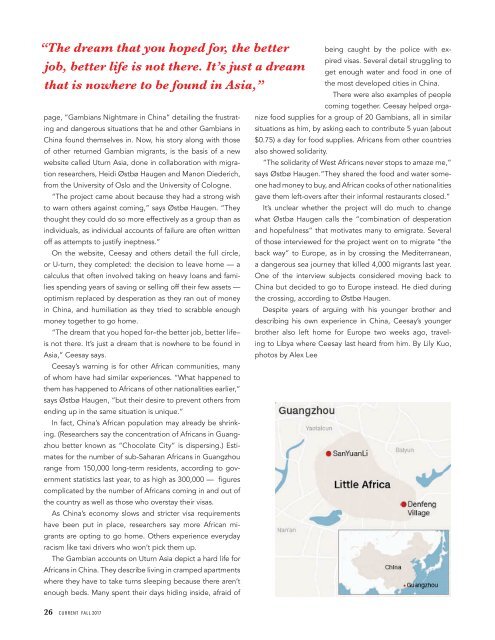Current Magazine
Create successful ePaper yourself
Turn your PDF publications into a flip-book with our unique Google optimized e-Paper software.
“The dream that you hoped for, the better<br />
job, better life is not there. It’s just a dream<br />
that is nowhere to be found in Asia,”<br />
being caught by the police with expired<br />
visas. Several detail struggling to<br />
get enough water and food in one of<br />
the most developed cities in China.<br />
There were also examples of people<br />
coming together. Ceesay helped orga-<br />
page, “Gambians Nightmare in China” detailing the frustrating<br />
and dangerous situations that he and other Gambians in situations as him, by asking each to contribute 5 yuan (about<br />
nize food supplies for a group of 20 Gambians, all in similar<br />
China found themselves in. Now, his story along with those $0.75) a day for food supplies. Africans from other countries<br />
of other returned Gambian migrants, is the basis of a new also showed solidarity.<br />
website called Uturn Asia, done in collaboration with migration<br />
researchers, Heidi Østbø Haugen and Manon Diederich, says Østbø Haugen.”They shared the food and water some-<br />
“The solidarity of West Africans never stops to amaze me,”<br />
from the University of Oslo and the University of Cologne. one had money to buy, and African cooks of other nationalities<br />
“The project came about because they had a strong wish gave them left-overs after their informal restaurants closed.”<br />
to warn others against coming,” says Østbø Haugen. “They It’s unclear whether the project will do much to change<br />
thought they could do so more effectively as a group than as what Østbø Haugen calls the “combination of desperation<br />
individuals, as individual accounts of failure are often written and hopefulness” that motivates many to emigrate. Several<br />
off as attempts to justify ineptness.”<br />
of those interviewed for the project went on to migrate “the<br />
On the website, Ceesay and others detail the full circle, back way” to Europe, as in by crossing the Mediterranean,<br />
or U-turn, they completed: the decision to leave home — a a dangerous sea journey that killed 4,000 migrants last year.<br />
calculus that often involved taking on heavy loans and families<br />
spending years of saving or selling off their few assets — China but decided to go to Europe instead. He died during<br />
One of the interview subjects considered moving back to<br />
optimism replaced by desperation as they ran out of money the crossing, according to Østbø Haugen.<br />
in China, and humiliation as they tried to scrabble enough Despite years of arguing with his younger brother and<br />
money together to go home.<br />
describing his own experience in China, Ceesay’s younger<br />
“The dream that you hoped for–the better job, better life– brother also left home for Europe two weeks ago, traveling<br />
to Libya where Ceesay last heard from him. By Lily Kuo,<br />
is not there. It’s just a dream that is nowhere to be found in<br />
Asia,” Ceesay says.<br />
photos by Alex Lee<br />
Ceesay’s warning is for other African communities, many<br />
of whom have had similar experiences. “What happened to<br />
them has happened to Africans of other nationalities earlier,”<br />
says Østbø Haugen, “but their desire to prevent others from<br />
ending up in the same situation is unique.”<br />
In fact, China’s African population may already be shrinking.<br />
(Researchers say the concentration of Africans in Guangzhou<br />
better known as “Chocolate City” is dispersing.) Estimates<br />
for the number of sub-Saharan Africans in Guangzhou<br />
range from 150,000 long-term residents, according to government<br />
statistics last year, to as high as 300,000 — figures<br />
complicated by the number of Africans coming in and out of<br />
the country as well as those who overstay their visas.<br />
As China’s economy slows and stricter visa requirements<br />
have been put in place, researchers say more African migrants<br />
are opting to go home. Others experience everyday<br />
racism like taxi drivers who won’t pick them up.<br />
The Gambian accounts on Uturn Asia depict a hard life for<br />
Africans in China. They describe living in cramped apartments<br />
where they have to take turns sleeping because there aren’t<br />
enough beds. Many spent their days hiding inside, afraid of<br />
26 CURRENT FALL 2017





